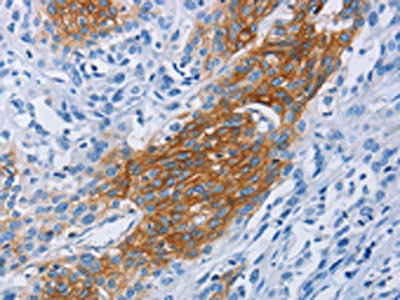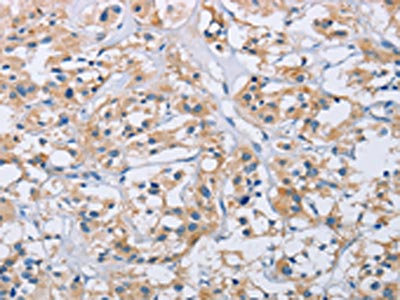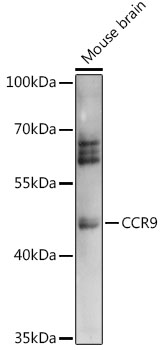
The image on the left is immunohistochemistry of paraffin-embedded Human esophagus cancer tissue using CSB-PA035070(CCR9 Antibody) at dilution 1/60, on the right is treated with fusion protein. (Original magnification: x200)
CCR9 Antibody
CSB-PA035070
ApplicationsELISA, ImmunoHistoChemistry
Product group Antibodies
ReactivityHuman, Mouse
TargetCCR9
Overview
- SupplierCusabio
- Product NameCCR9 Antibody
- Delivery Days Customer20
- ApplicationsELISA, ImmunoHistoChemistry
- CertificationResearch Use Only
- ClonalityPolyclonal
- ConjugateUnconjugated
- Gene ID10803
- Target nameCCR9
- Target descriptionC-C motif chemokine receptor 9
- Target synonymsCC-CKR-9, CDw199, GPR-9-6, GPR28, C-C chemokine receptor type 9, G protein-coupled receptor 28, chemokine (C-C motif) receptor 9
- HostRabbit
- IsotypeIgG
- Protein IDP51686
- Protein NameC-C chemokine receptor type 9
- Scientific DescriptionThe protein encoded by this gene is a member of the beta chemokine receptor family. It is predicted to be a seven transmembrane protein similar to G protein-coupled receptors. Chemokines and their receptors are key regulators of the thymocytes migration and maturation in normal and inflammation conditions. The specific ligand of this receptor is CCL25. It has been found that this gene is differentially expressed by T lymphocytes of small intestine and colon, suggested a role in the thymocytes recruitment and development that may permit functional specialization of immune responses in different segment of the gastrointestinal tract. This gene is mapped to the chemokine receptor gene cluster region.
- ReactivityHuman, Mouse
- Storage Instruction-20°C or -80°C
- UNSPSC41116161







![CCR9 antibody [HL3054] detects CCR9 protein by immunohistochemical analysis. Sample: Paraffin-embedded human pancreatic cancer. CCR9 stained by CCR9 antibody [HL3054] (GTX640497) diluted at 1:100. Antigen Retrieval: Citrate buffer, pH 6.0, 15 min](https://www.genetex.com/upload/website/prouct_img/normal/GTX640497/GTX640497_T-45439_20240705_IHC-P_24070822_793.webp)